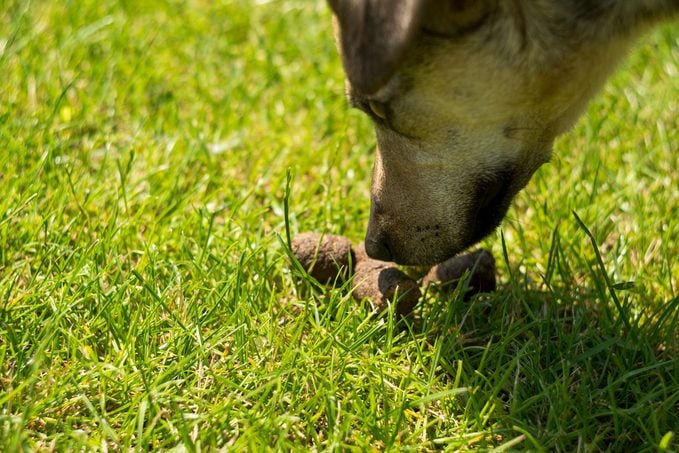This Is Why Your Dog Likes To Eat Its Poop
Updated: Jun. 08, 2023
Or other dog poop, for that matter.

Your dog sure has some weird behaviors—especially when it comes to going to the bathroom. Between kicking up your lawn after they pee, or even spinning before they poop, your dog is very particular about where to go, and what tracks they’re leaving behind. While you also must put in the time and training to stop dogs from peeing in the house.
Apparently, this is also true for dogs who eat poop. While this may seem gross to read about, it’s probably not surprising to hear. Eating poop is a pretty common practice for dogs for many different reasons.
Mimicking behavior
According to Pet MD, one of the more common reasons dogs will eat their poop is mimicking what they’ve seen while growing up. It’s typical for mothers to eat the puppy’s feces in order to protect the puppy from predators. Without feces, there’s no scent to track. The puppy will obviously mimic the behavior of the mother.
However, once the puppy starts to defecate solid waste, the mother will stop consuming the feces because the dog is grown enough to leave the den and go to the bathroom on their own. But the behavior doesn’t end there, since consuming feces is what they’ve always known.
While mimicking behavior is a common reason for eating poop, it’s not something that commonly happens when you adopt a new puppy. There are other reasons that a common household dog will also eat poop without behavior to mimic. Try these solutions to keep a dog from pooping in your yard.
Stressing out
Trauma is another common reason dogs will eat poop. When dogs are brought into stressful environments—such as a new home or exposure to an unknown location—it’s a common reaction. It’s important to nip that behavior in the bud as soon as you see it.
However, it’s also important to not stress out the dog when you see the behavior. If you react poorly to this particular behavior, the dog may think that going to the bathroom is bad and will continue to eat the poop as a way to hide that “bad” behavior. This tends to be a behavior that dogs from abused homes will also pick up, due to their stressful environments. Find out the reason behind your dog following you into the bathroom.
Experiencing boredom
If you’re leaving the dog in the kennel for long periods of time, the dog can get bored. Eating and playing with poop can be a way to break up that boredom.
Feeling malnourished
Malnourishment can happen in two forms. The first is simply not feeding your dog enough. Some puppies need more food than usual while they are growing, sometimes needing to eat up to three times a day. If a puppy, or a dog, isn’t getting fed all of the nutrients it needs, it will try to receive those nutrients within their feces.
Hunger can also happen if the dog is living with some kind of worm or intestinal parasite, making the dog feel hungrier.
Needing attention
Some dogs may be scared of a huge reaction from eating poop, but others may find it as a way to gather attention. If you reacted to this behavior in the past, and the dog hasn’t been receiving much attention, your puppy will probably elicit this behavior again in order to receive attention from you.
Digestion issues
Lastly, there could be an issue with what the dog is eating. If the food has poor nutrients, or your dog isn’t able to digest it properly, then it may turn to feces similar to how dog’s turn to it during malnourishment.
How to stop it
While there are multiple reasons a dog will eat its own poop, there are ways to eliminate the behavior no matter the cause.
- Feed the dog good quality, nutrient-rich food.
- Make sure your dog is getting enough exercise and activity
- Clean up when your puppy poops! Here are 8 genius ways to pick up your dog’s poop
- Discourage your dog from the behavior, but do not overreact. Reward your dog each time they don’t perform this behavior.
All in all, if your dog is emitting this behavior, it’s always best to talk to a veterinarian. It may help with deciphering the specific reason for the behavior. Especially if that reason is some sort of sickness or digestion issue.